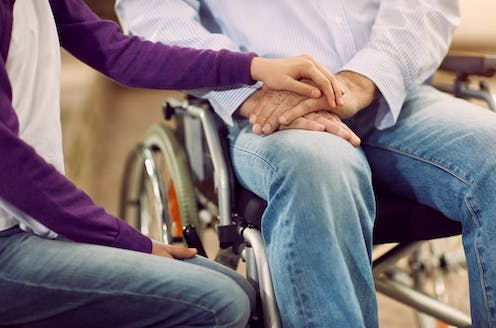
Canadians who lost their incomes and accumulated debt during COVID-19 are still struggling to recover financially. Between 2019 and 2022, one-third fewer Canadians said they had an emergency fund that would cover three months of expenses.
The pandemic revealed gaps in how we collectively address those most vulnerable in times of crisis. Many struggled with government-mandated countermeasures, from masks to social distancing to accessing PPE and vaccines.
The pandemic left many without work, and for those who were able to keep their jobs, the very nature of work changed drastically. Some experienced reduced hours while others, including those working remotely, saw more work. Many struggled to maintain a healthy work-life balance, and others tried to stay financially afloat through government supports.
What is clear is that individuals who were in financially precarious situations before the pandemic were hit the hardest, and are now dealing with inflation and higher costs of living. Canadians on fixed disability benefits are among those struggling the most with high inflation.
Table of Contents
Work doesn’t guarantee liveable income
Just under half of disabled Canadians were out of work before the COVID-19 pandemic, but even for those who do have jobs, employment doesn’t guarantee a life without poverty.
When Canadians with disabilities do work, they tend to hold low-paying, precarious, non-union jobs in the food and service sectors. It makes sense that many people with disabilities end up mobilizing other sources of income to make ends meet, including savings, family supports and government benefits.

(Shutterstock)
Based on an analysis of over 1,000 Canadians with disabilities, our new study found that individuals used family, savings and government supports to supplement inadequate employment income during the pandemic. But, access to these different supports varied considerably.
While these supports are incredibly important for people with disabilities, many people face obstacles in accessing them in the first place. Restrictive benefits often exclude many who need them, and income support programs can keep people trapped in bad jobs.
Nothing to fall back on
Our study found that individuals who remained employed — especially those in good jobs — felt the most secure. But even among this more secure group, the pandemic was a wake-up call. As one person told us:
“[I]f I was to lose my job, or if anything was to happen, my savings aren’t enough to pay the bills.”
People with disabilities have 25 per cent less in assets than Canadians without disabilities, which means they can’t rely as much on rainy-day funds.
Many individuals tapped into their savings to make ends meet. This eased concerns for some people, but others — like those nearing retirement — worried their savings would never recover. As one respondent noted:
“All our lives we’ve put money aside for retirement and figured we had enough. But now with the economy and the stock markets and everything we’re really worried.”
Most of the people we interviewed were unemployed and had to make use of a combination of resources. When they were successful at doing so, respondents expressed fewer concerns about their current and future economic insecurity.
Government support was crucial
Family and household resources were critical to individuals who struggled with both employment income and savings.
Although individuals felt more secure living with another income earner, having children in the household or having to provide resources to other family members generated concerns about economic insecurity.
One respondent said:
“The problem is more so helping other family members that have been laid off and so forth. So that’s taken a big chunk of my savings.”
This is why government supports were so important during the pandemic. They provided stability when jobs, savings and family weren’t enough.
This support was crucial considering households with disabilities tend to face higher living expenses and income penalties, particularly when other household members take time off work to provide care. The Canada Emergency Response Benefit (CERB) was an important stop-gap for many respondents who lost income during the pandemic.

THE CANADIAN PRESS/Giordano Ciampini
Disabled people who were registered with a federal disability tax credit were 12 per cent less likely to think their financial futures would worsen. However, only 11 per cent of respondents were registered for it.
Similarly, while a disability tax credit is required for opening a Registered Disability Savings Plan, only 32 per cent of disabled Canadians make use of the savings plan according to a recent Statistics Canada report.
Where does this leave us?
There’s much to appreciate about Canada’s policy response to COVID-19. The country acted quickly to provide income for those losing employment and expanded a range of benefits to create additional supports.
These actions helped low-income workers throughout Canada, but left out those without access to the labour market. Fewer than 40 per cent of disabled workers received CERB, a figure that excludes all the non-workers who were ineligible.
The federal government’s over-reliance on the provinces to distribute benefits and support also meant that responses to the COVID-19 pandemic varied across the country.
This was part of a larger movement that has been shifting economic risks and burdens to individuals, emphasizing personal responsibility rather than structural inequalities. This kind of approach to policy-making is detrimental to people with disabilities who access government benefits to support their income.
The recent re-introduction and tabling of Bill C-22, which aims to create new disability benefits for working-age Canadians, is a step in the right direction.
The bill was introduced by the Liberal government in June 2021, but died when Prime Minister Justin Trudeau called the federal election. Now, most likely in response to the public outcry about how little the federal government did for Canadians with disabilities during the pandemic, it’s back on the table. However, it has disabled Canadians wondering if it’s too little, too late.
![]()
David Pettinicchio receives funding from Social Sciences and Humanities Research Council of Canada
Michelle Maroto receives funding from the Social Sciences and Humanities Research Council of Canada (SSHRC).
























